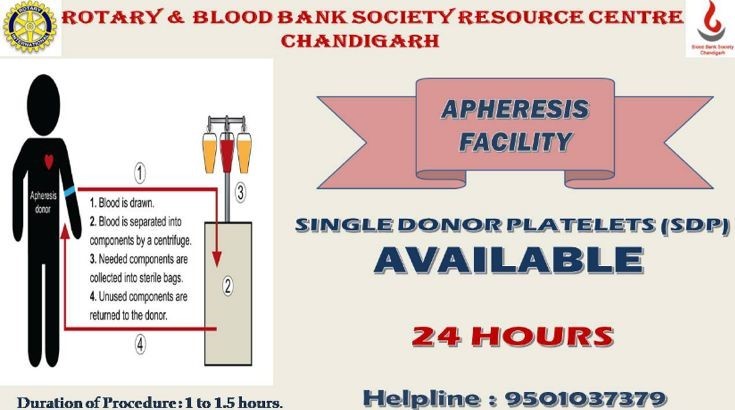
Dr. Manish Rai
Director
Rotary and Blood Bank Society Resource Centre, Sector 37, Chandigarh
APHERESIS
Apheresis is an extracorporeal procedure in which blood passes through an equipment and its basic components (Red Blood Cells [RBCs], Platelets, Plasma and Plasma Proteins) can be separated and removed from the body.
Apheresis is a process that involves removing whole blood from a donor or patient and then separating it into various components, including plasma, platelets and leukocytes. The desired component is collected, and the remainder of the blood is returned to the body. The American medical technologist, Herb Cullis, invented the apheresis machine in 1972.
Apheresis blood collection, or ABC, is a special kind of blood donation. Instead of giving one pint of whole blood (as in a regular donation), an ABC donor gives only the components of blood needed for patients that day.
Blood is drawn from the donor and the platelets, or another blood component, are collected by the cell separator and the remaining components of the blood are returned to the donor during the donation. Each apheresis donation procedure takes about one-and-one-half to two hours.
For apheresis procedures, the total volume of donated plasma, platelets and red cells collected should not exceed 13% of total blood volume (70) and the maximum extracorporeal blood volume should not exceed 15% of the donor’s total blood volume at any stage of the procedure.
There are several advantages of Apheresis compared to whole blood donation:
1) A person can donate more frequently; as much as twice a week,
2) There is less exposure to several blood donors, and
3) There is less possible transfusion reaction.
Plateletpheresis: this is the most common means for supplying HLA matched platelets to patients who have become HLA sensitized and require platelets from a single donor whose HLA type matches theirs.
Plasmapheresis: the plasma can be removed to supply blood components such as clotting factors.
PRE-REQUISITES FOR A DONOR FOR APHERESIS
General Appearance | Good Health |
Age & Sex | 18 to 60 years – Male Donors preferred. First Degree Family Donors to be avoided. |
Weight | >50 kg |
Haemoglobin | >12.5 gram/dl |
BP | Systolic : Diastolic : 60 – 90 |
Last Meal | should not be > 4 hours |
Last Blood Donation | should be > 28 days |
Last Platelet Apheresis Donation | should be > 48 hours |
Platelet Count | >1,50,000/ul |
Screening: Final fitness clearance is given after detailed history analysis, lab testing and satisfactory physical examination. | |

